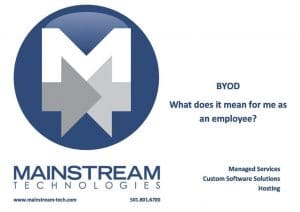
Employers have their own challenges in managing their BYOD policy, but as an employee, you should be aware that if you choose to use your own device you’ll enter into an arrangement that exceeds the normal employer/employee relationship. Depending on your firm’s BYOD policy, you could be giving up some autonomy over your device and also compromising your privacy rights. Be thoughtful, everything has its price!
Here are some things you should consider while you’re reviewing your company’s BYOD policy and before you choose to use your own device for business.
Will you be required to give up ownership of your personal #?[1]
In the case of smartphones, in return for allowing access to company information, some employers may assume ownership of your phone number. In the event you leave the company for any reason at all, it’s up to them as to whether they’ll allow you take your number with you.
An employer could delete your information or wipe the device at any time.
The extent of the privacy you give up depends on your firm’s BYOD policy. Some companies reserve the right to wipe your device memory or lock it if they feel it’s in their best interest. In most cases, this only occurs if there’s a threat that their proprietary information is at risk. Examples of this are if you leave the firm, if you lose or misplace it, or turn it into your provider for an upgrade.
If they wipe it your personal information is at risk, pictures of the kids, personal contacts or any personal files you’ve created. Even though there are tools out there that tout they can selectively target only company data, don’t count on it. User errors can and do happen. Be sure and backup your personal information![2]
You may need permission to upgrade your device
If you want the latest and the greatest upgrade to your device, you may need to get your firm’s permission. Depending on their policy, they may reserve the right to deny service to a new device since it might not be supportable in their technology environment.
You’re responsible for the company information on your device
In the event that company information stored on your device is deleted, destroyed or stolen, you’ll be responsible. A stolen phone with company credit card information could be disastrous. If you share your device with your spouse and a file is accidentally deleted, you’ll be responsible. And by all means, keep it out of the hands of your 6-year-old! We all know the havoc they can cause!
Litigation is always a headache!
If your firm gets involved in litigation of any kind, since your personal device is used for business, it could be confiscated for discovery or fact-finding. Anything and everything on your device, business or personal, is now fair game.[3]
Your employer can track your movements and activity 24/7!
You may be required to install company apps on your device?
Security is paramount. If you’re going to access your firm’s technology infrastructure they have the obligation to protect their systems and data in every way possible. Installing a security app or corporate antivirus may very well slow down the performance of your device.
Your device is the weak link in information security.[4]
Every external device that connects to your firm’s network is a possible point of failure or entry point for hackers and malware breaches. Your device is considered the weak link in the security chain by your IT staff. By using your own device you accept an increased level of responsibility for information security.[5]
In many cases, “Bring Your Own Device,” turns out to be a misnomer in practice. So much for “own.”5
BYOD offers some advantages for both the employer and employee, but as you’re considering your options, we encourage you to think through the responsibilities you’re accepting if you do choose to use your own device.
“Be careful not to compromise what you want most for what you want now.”
Zig Zigler
“You’ve got to be very careful if you don’t know where you are going because you might not get there.”
Yogi Berra
##
[1] http://www.cio.com/article/2395549/byod/byod-s-phone-number-problem.html
[2] http://online.wsj.com/news/articles/SB10001424052702304027204579335033824665964?KEYWORDS=BYOD
[3] http://www.informationweek.com/mobile/6-risks-your-byod-policy-must-address/d/d-id/1107451?page_number=1
[4] http://www.computerweekly.com/news/2240161202/Nearly-half-of-firms-supporting-BYOD-report-data-breaches
[5] http://fortune.com/2014/07/24/bring-your-own-device-byod-enterprise-showdown/





